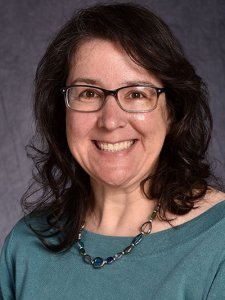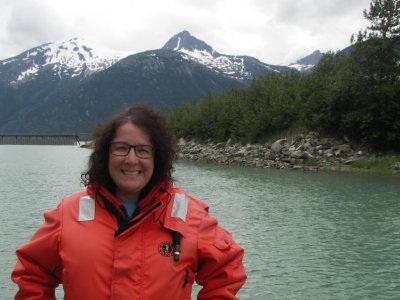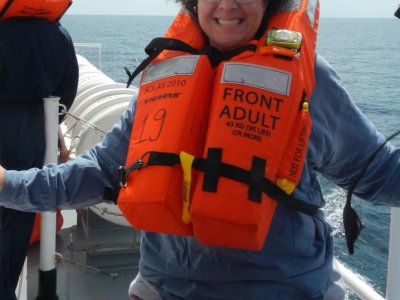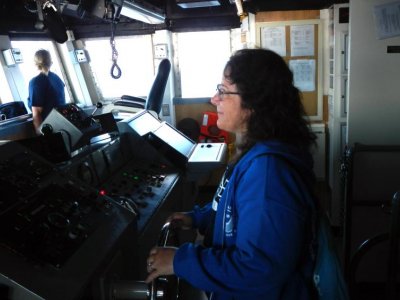I thought I had everything worked out perfectly, outside of a pandemic.
Part of why I became a marine geologist is because of my love of the ocean— including, being out on the ocean. The last time I was on a ship was during my last sabbatical in 2014, when I joined a hydrographic survey on NOAA (National Oceanic and Atmospheric Administration) Ship Thomas Jefferson. I knew I was eligible for a sabbatical again in the 2020–2021 academic year, so in 2019 I applied and in 2020 was accepted for two experiences at sea—one with NOAA, one with the International Ocean Discovery Program (IODP) on the ship JOIDES Resolution.
In March, I received news that NOAA would not be sailing any educators on their ships for the 2020 season. IODP continued with the preparations for Expedition 390, scheduled to sail from Rio de Janeiro, Brazil, on October 5—yet there was now a COVID medical form to be completed in addition to the 18-page medical packet for clearance to sail. Trying to secure medical appointments and testing necessary for this medical approval was quite challenging during this time.
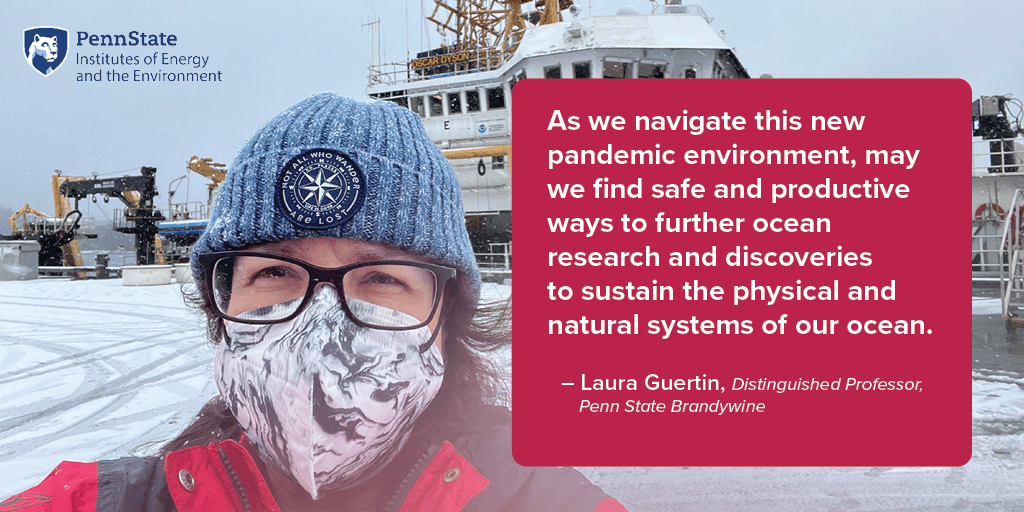
In June 2020, IODP announced that their pandemic plans required sailing a smaller number of shipboard scientists for better social distancing and space on JOIDES Resolution (JR). There was a change in the departure port, now leaving from Montevido, Uruguay, due to COVID outbreaks in Brazil. In July, and on my birthday, I received the news that I was one of the scientists that would not be sailing.
It’s amazing how quickly I went from hopes of going to sea twice in 2020, to not at all.
But in September, I received news that IODP Expedition 390 would be rescheduled to April-June 2022, now departing from and returning to Cape Town.
There were no updates until January 2021, when NOAA informed me that they would be waiting another year before sailing any educators on their ships and to stay tuned for news on a 2022 expedition.
In November 2021, NOAA contacted me to say I was assigned to join NOAA Ship Oscar Dyson on Kodiak Island, Alaska, for an acoustic trawl fisheries survey. Because of the pandemic protocols, this wasn’t a typical preparation and departure for an at-sea adventure. I started with a 10-day RCP (reduced contact period) at home with a daily health questionnaire for self-monitoring any COVID symptoms, and a polymerase chain reaction (PCR) test, a more invasive test that determines if you are infected by analyzing a sample to see if it contains genetic material from the virus. This test was required 72 hours before my two-day flight to Alaska.
The ship had a weather delay transiting from Washington to Alaska, but that didn’t interrupt my flying schedule. After another five days, we all reported for another PCR test, and we were all cleared to sail. We were to check out of the hotel at 7 a.m. and head over to the ship for a 9:30 a.m. departure on Sunday, February 13.
It was finally time to board the ship and head out to sea! I was standing at the front desk of the hotel. I had literally just finished checking out and turned in my room key. The Chief Scientist comes through the lobby to tell us to not leave our rooms, as Oscar Dyson’s commanding officer reported there was a mechanical/electrical issue with the ship.
At the end of the day, it was determined that the engine repair would not be a quick fix, and as we had lost too much time on the water due to weather/COVID/ship issues, we were told to change our flights and leave Alaska. On Valentine’s Day, we all started our journeys back home without ever getting out to sea.
Why do I share this narrative with this detail? For some scientists, these delays are a significant impact on their careers. But there’s a bigger story here—one where areas of scientific discovery and data collection from field-based oceanographic research have been delayed for a significant period.
Certainly, in geologic time, the postponement of these research expeditions is less than a blink of the eye. But how long can we wait to carry out these surveys to ensure we maintain sustainable fisheries in the Gulf of Alaska and Bering Sea? We know that warming temperatures are impacting our higher latitudes faster than other regions of the globe, and the survey data is necessary to keep the pollock population healthy in numbers and to follow their geographic distribution (see one article from NOAA on this very topic).
I leave on March 31 to begin my next two-day journey to a ship – but this time, to Cape Town, South Africa, to join JOIDES Resolution.
Heading out to sea is never easy, as there are so many logistics to coordinate in our professional and personal lives. For myself, what started with applications to sail in 2019 and original sailing dates in 2020 are now (hopefully) resulting in time at sea—in 2022.
There’s no way to catch up on all the missed data collection and time on the water. What discoveries are not being made? Which data are not being collected to support sustainable practices, the drafting of new ocean policies, the protection of marine cultural resources, etc.?
My heart aches for the research not happening and the protection plans for our ocean communities that are not getting updated. As we navigate this new pandemic environment, may we find safe and productive ways to further ocean research and discoveries to sustain the physical and natural systems of our ocean.
A more complete and detailed version of this narrative can be found at: https://journeysofdrg.org/2022/03/18/waiting-ships-sail/


